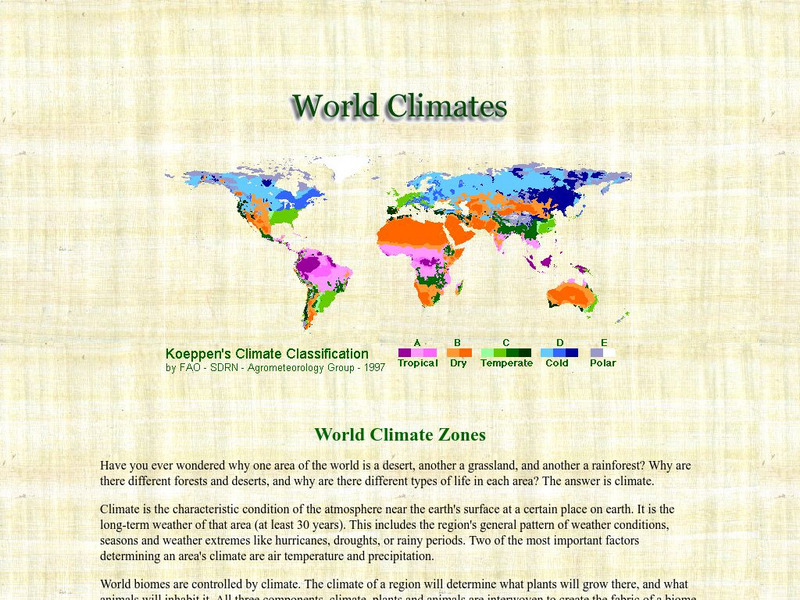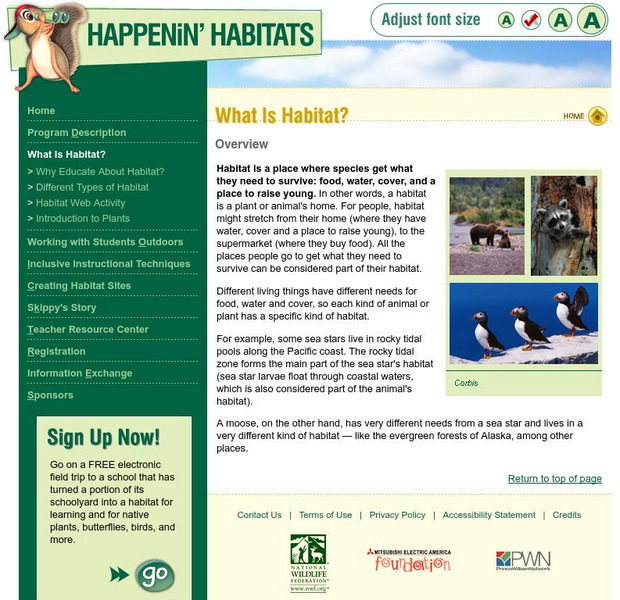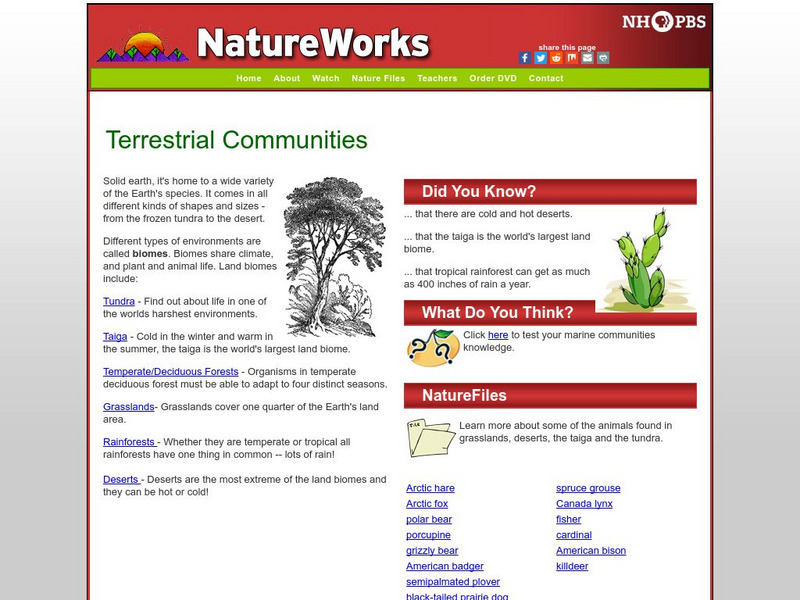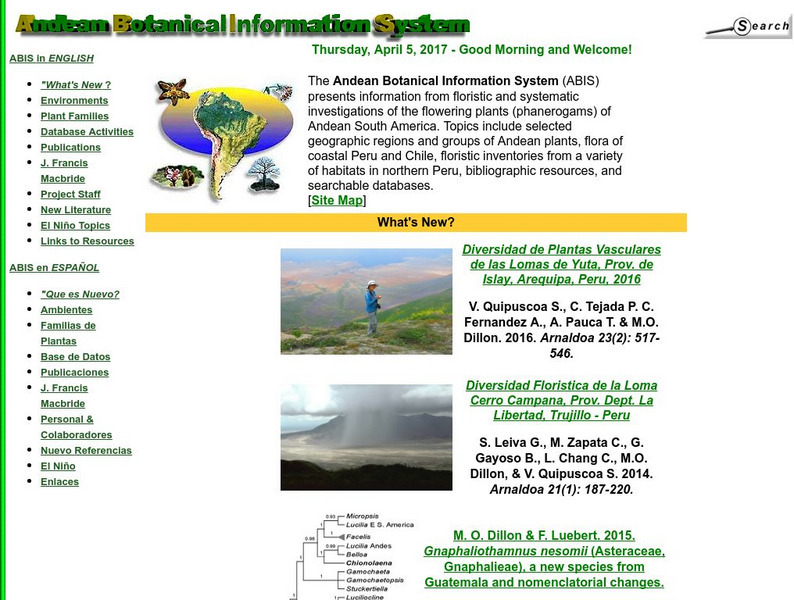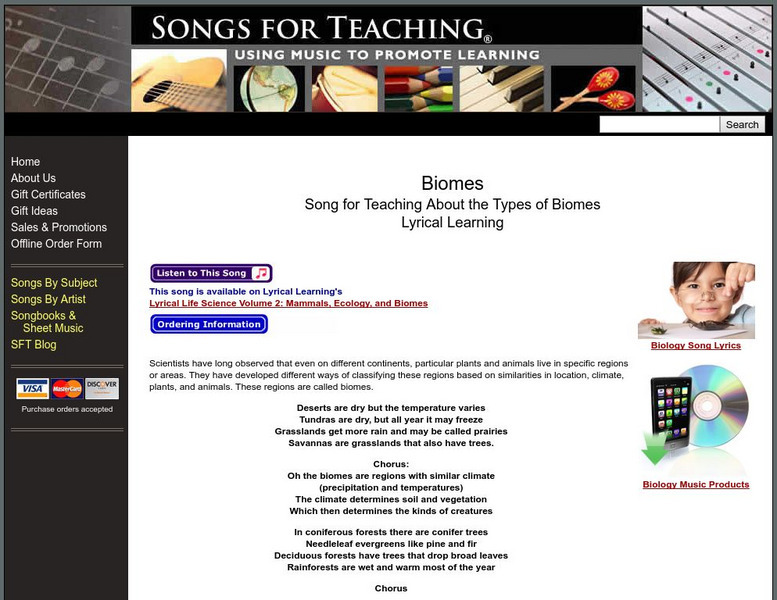Hi, what do you want to do?
Other
Blue Planet Biomes: World Climates
Have you ever wondered why one area of the world is a desert, another a grassland, and another a rainforest? Why are there different forests and deserts, and why are there different types of life in each area? The answer is climate.
Geography 4 kids
Geography4 kids.com: Types of Climates
Discover a few types of climates found on the earth like rain forests and deserts.
Other
National Wildlife Federation: Happenin' Habitats: What Is Habitat?
Find an overview of what a habitat is exactly. Then, for more information, click in the left hand menu for different types of habitat: forests, grasslands, deserts, wetlands, and arctic tundra. Authors also offer advice on creating a...
PBS
Nh Pbs: Nature Works: Terrestrial Communities
Explore land ecosystems around Earth. Learn about forests, tundra, taiga, grasslands, and deserts.
The Association of the British Pharmaceutical Industry
Abpi: Human and Animal Habitats
An interactive learning game where students answer whether or not certain environments would be suitable for different animals. Printable worksheets are available for review at the end of the activity.
Utah Education Network
Uen: Utah's Plants and Animals Do You Know Where I Live?
Can you figure out what types of biomes different organisms belong in? You'll be presented with a variety of organisms and asked which of three biomes they belong in.
Ducksters
Ducksters: Science for Kids: World Biomes and Ecosystems
Kids learn about the world's biomes and ecosystems. The network of life and biodiversity needed for all to survive.
ClassFlow
Class Flow: Plant and Animal Habitats
[Free Registration/Login Required] This lesson explains plant and animal habitats with brilliant pictures and photos. It also includes discussion and non-Activote questions.
Palomar Community College District
Major Biomes of North America
A good review of basic terminology followed by descriptions and pictures of the North American biomes.
Other
Andean Botanical Information System
Great research from the Andean Botanical Information System into the diverse environments and plants of the Andean region of South America, and particularly Chile and Peru. Available in Spanish or English, photographs and written...
Curated OER
Etc: Maps Etc: United States and Neighboring Lands, 1920
A map from 1920 of southern Canada, the United States, and northern Mexico showing terrain features, lakes and river systems, and general vegetation types of the region. The map is keyed to show the submerged portion of the continental...
Curated OER
Bureau of Land Management: Bureau of Land Management
The BLM manages one in every 10 acres of land in the United States, and approximately 30 percent of the Nation's minerals. These lands and minerals are found in every state in the country and encompass forests, mountains, rangelands,...
Smithsonian Institution
National Museum of Natural History: American Mammals: Mexican Long Nosed Bat
The Mexican long-nosed bat feeds mainly on the nectar and pollen of agaves, and is found in Texas in June and July when the plants are in bloom there. Then it migrates southward into Mexico, where it lives in pine-oak forests and...
Channel 4 Learning
4 Learning: Geography Essentials, Weather Around the World
This resource offers in-depth information on weather and different types of climate including desert, tropical rain forests, and more. Also provides worksheets (Word documents) and images relating to weather.
PBS
Pbs Learning Media: Biomes
This interactive resource adapted from NASA describes the different temperature, precipitation, and vegetation patterns in seven biomes: coniferous forest, temperate deciduous forest, desert, grassland, rainforest, shrubland, and tundra.
Enchanted Learning
Enchanted Learning: Biomes
Discover the hidden treasures in the different habitats on the earth! The earth is filled with many biomes. Examples of different biomes are listed and include hyperlinks to additional information such as the animals found there.
Other
Introduction to the Biosphere: Characteristics of the Earth's Terrestrial Biomes
From Chapter 9 of a textbook on physical geography that covers the biosphere. Important vocabulary is highlighted and linked to a glossary. It explains the characteristics of a biome, and describes the features of the eight different...
Utah Education Network
Uen: Science Vocabulary Game
Fourth graders will play a review memory game with Utah's Grade 4 Science Standard V vocabulary words during this lesson. Words associated with living things and classifications of living things are included in this lesson.
Utah Education Network
Uen: Nhmu: Living Food Web
Fourth graders will be able to name some plants and animals that live in Utah's desert, forest or wetland ecosystems.
Songs for Teaching
Songs for Teaching: Biomes
Use this site to see how many of the animals and plants that your students can remember from each biome after listening to this song.
Songs for Teaching
Songs for Teaching: Types of Biomes
Doug Eldon performs this great song which tells about the different biomes and their characteristics. Great way to begin your unit on the biomes.
Wonderville Media
Wonderville: African Elephants
African elephants are the biggest land animals on the planet, standing up to 13 feet tall and weighing as much as 14,000 pounds. They are even bigger than their elephant cousins in Asia. You can tell them apart because their ears...
Other
Eco Library: Panoramas
Features amazing 360 degrees interactive panoramas for students to help them better understand ecological variation on our planet. Searchable by biome/ecosystem type, location, or ecological phenomena they depict.
Other
World Biomes
World Biomes is a site covering five of the major world biomes: aquatic, desert, forest, grassland, and tundra. It gives information on the various sub-divisions of the biomes and provides numerous images.





